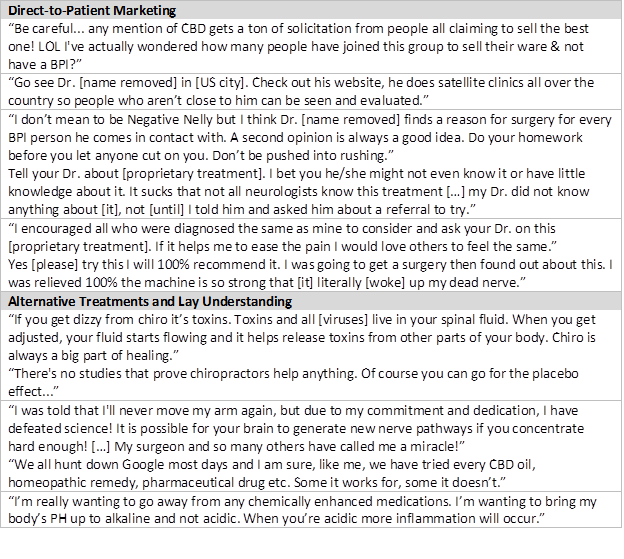"More snake oil, I fear": The Promotion of Alternative Treatment Modalities to BPI Patients Through Facebook by Lay Members and Covert Sale Methods
Eric Zhu, BA1, Emma Smolev, BA1, David M Brogan, MD, MSc2 and Christopher J. Dy, MD, MPH, FACS3, (1)Washington University, St. Louis, MO, (2)Washington University School of Medicine, St. Louis, MO, (3)Washington University in St. Louis, St. Louis, MO
“More snake oil, I fear”: The Promotion of Alternative Treatment Modalities to BPI Patients Through Facebook by Lay Members and Covert Sale Methods
Introduction: Facebook groups dedicated to brachial plexus injury (BPI) are frequently used by patients seeking support and medical advice from peers. We hypothesized that a qualitative thematic analysis of BPI Facebook group posts would uncover reveal information on purported alternative treatments for BPI, claims about their effectiveness, and promotion tactics used.
Materials and Methods: The two most popular open membership BPI Facebook groups were identified by searching “traumatic brachial plexus injury”. Posts from November 1, 2018 to October 31, 2019 which contained comments regarding experiences with traumatic BPI were analyzed. Posts on birth-related palsy and social content were excluded. We used inductive and deductive qualitative thematic analysis to identify recurring topics, knowledge gaps, and patient interaction dynamics. Two study team members coded all posts independently. Discrepancies were resolved by a qualitative research specialist.
Results: Posters discussed a variety of alternative treatments with a wide range of efficacy and validity. Recurring topics included stem cell injections, acupuncture, chiropractic care, CBD products, homeopathic or herbal remedies, and essential oils. Frequently, posts were written in a manner to covertly market products directly to patients. Such posts often featured testimonials from group members as a means of “validating” the product to others. Posts on certain brands of CBD oils and essential oils were particularly common, and were typically sold by established group members acting as agents of various multilevel marketing schemes. Other posts promoted proprietary or unproven treatments as “cutting edge” medical treatment. Such posts were often written in a way that would be more appealing to desperate patients or those relying primarily on social media for medical information. Posts discussing alternative treatments generally received very hopeful and enthusiastic responses from BPI patients, who often expressed desperation for effective treatment after failing to respond to traditional medical interventions. It was exceedingly rare that such posts received any contradictory responses or were questioned for legitimacy.
Conclusions: BPI patients often express vulnerability openly, allowing social media to serve as a platform for the promotion and proliferation of unproven alternative treatment. Efforts like covert marketing posts are designed to convey compassion, in order to appeal to patients’ desperation. Clinicians involved in treating BPI patients should be aware of the claims, sales tactics, and current trends regarding alternative treatments for BPI.

Back to 2021 ePosters
